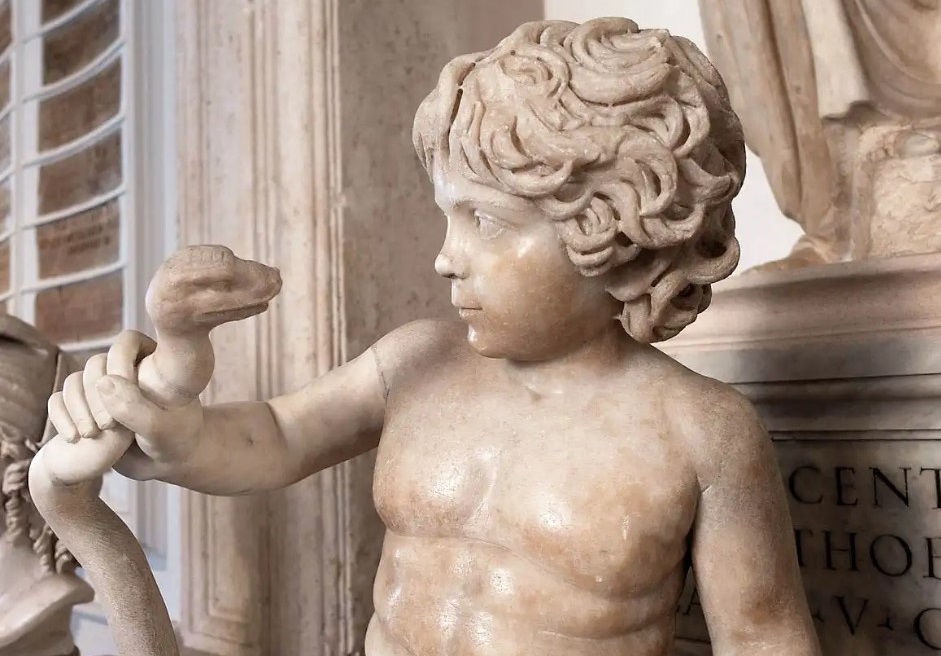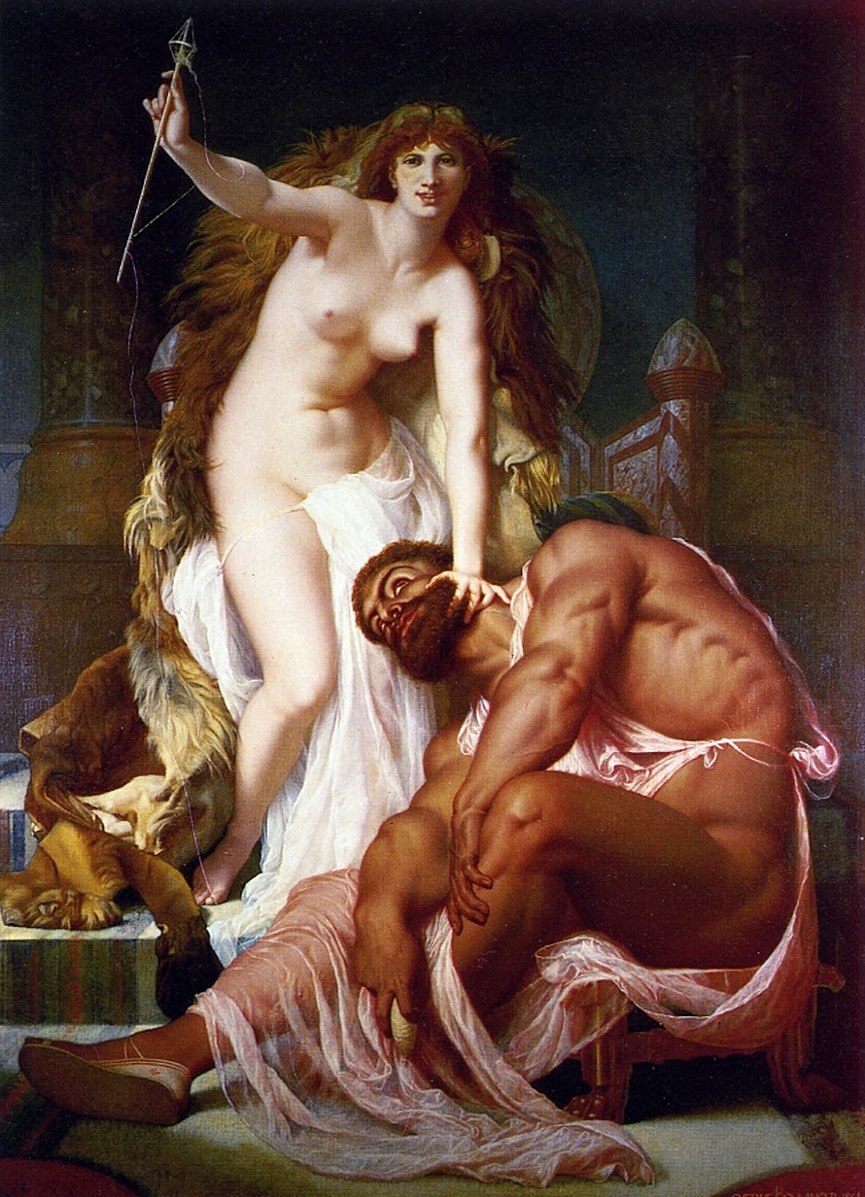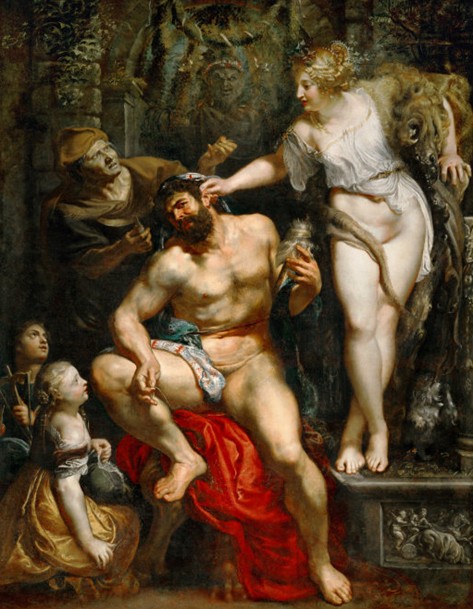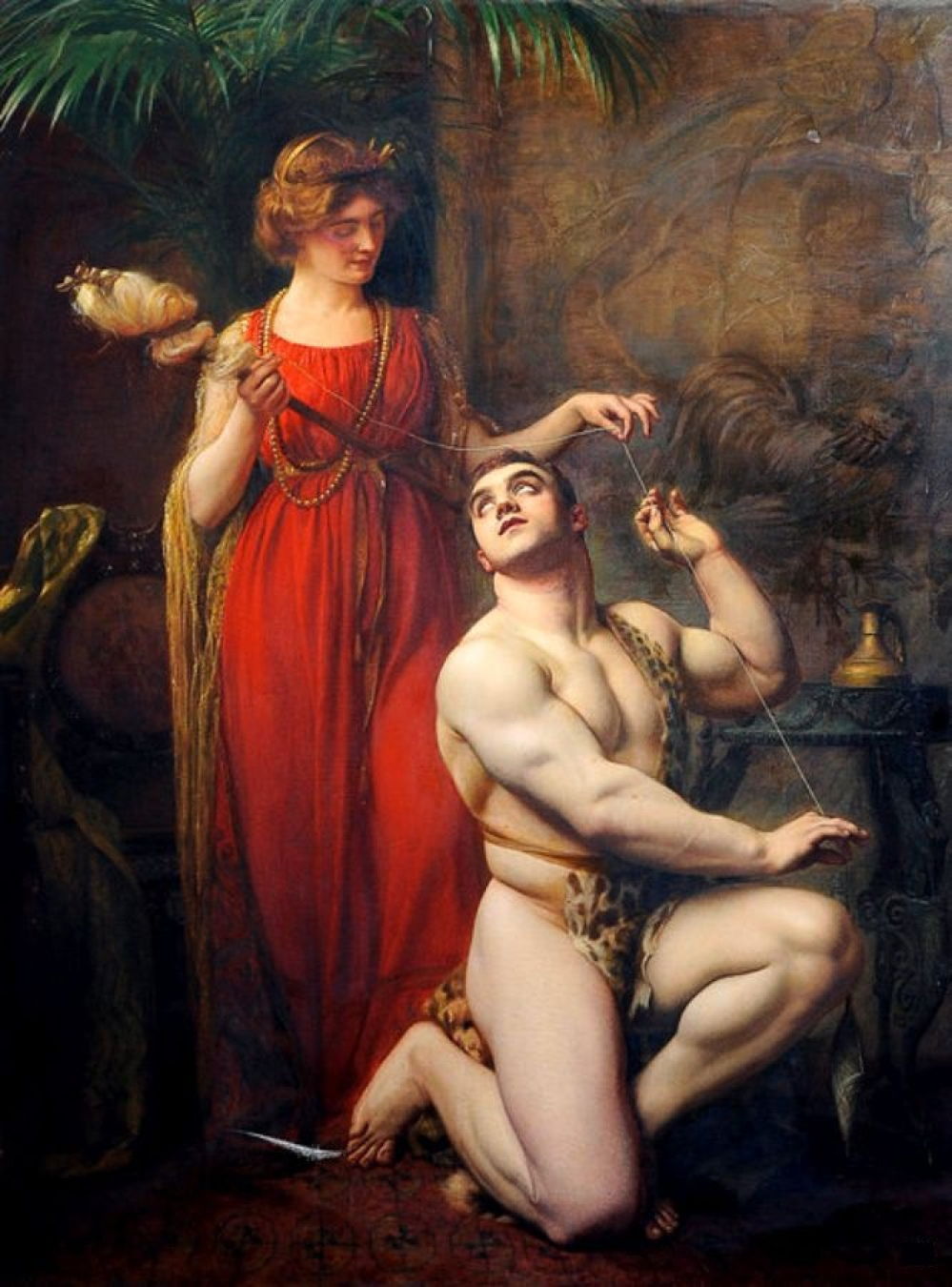Guilt is a trap used to enslave men. By citing real or concocted transgressions, people are quick to saddle men with guilt (you did wrong) and social shame (you are not a good man), charges which are then leveraged to extract male labor as a means of atonement. This dynamic of male existence is nowhere better illustrated than in the story of The Twelve Labors of Heracles.
Heracles (known to Romans as Hercules) is one of the best-known heroes of classical mythology. Looking past his admirable masculine swagger, we see that his life was no picnic. He endured many trials and completed many daunting tasks, with the reward for his struggles being that he might live forever as a Real Man™ among the mythical gods of Olympus.
Focusing on his misdemeanors or on his great feats, but never on his pain (the story of everyman!), we tend to overlook the fact that Heracles life was beset by tragedy and stress, with many of his deeds driven by a desire to escape intolerable feelings of guilt. Like a determined MMA fighter Heracles took all of this in his stride, and the fact that he displayed courage, strength, skill and endurance under stress deserves that we take a closer, and dare we say compassionate look at the demons that assailed him.
The story of the Twelve Labors of Heracles
The rise of guilt
There’s no doubt that Heracles’ feelings of guilt arose from the misdeeds he perpetrated; from his occasional insensitivity, to the more damning crime of murder (of which we will say more below). However, there was much more going on behind the scenes that worked to strain his composure and pushed him to commit such terrible deeds. The primary provocateur, who was constantly provoking him, was his step-mother Hera — the very same goddess who was pleased to see him tormented by guilt after his crimes had transpired.
Hera’s provocations of Heracles were not isolated to a few occasions, as she is said to have persecuted him from the moment of his birth and throughout his entire life; “Even as an infant not yet a year old,” tells the myth, “Hera sent venomous snakes to kill the boy while he slept in his cradle, but Heracles awoke and strangled them.”

We can conclude that Hera embodied the archetype of the spiteful feminist who frequently disdained men while viewing their role as one of service to women. After reading many of the Greek stories it’s fair to conclude that Hera can be considered, more than all the other goddesses, a poster girl for coercive control, manipulation, spite, jealousy and nagging – she is what we might call the Queen of relational aggression.
According to American sociologist Philip Slater, Hera represents narcissism in her attitude toward Heracles, stating that this was part of the reason she dealt the severest blows to him and imposed pain, grief, and labor on him — she both envied Heracles and wanted him to bring her status and glory.1 Representing a kind of love-hate dynamic, Slater summarizes:
Heracles is attacked in the womb, as an infant, and as a grown man, with Hera once again the persecutor. The attack which destroys him, however, comes after all of these, in his gruesome death on Mount Oeta. Even his labors are an expression of Hera’s malevolence, as well as many of the supplementary difficulties which he must endure in carrying them out.
Hera’s enmity toward Heracles is supposed initially to have been aroused by Zeus’s affair with Alcmene (Heracles’ mortal mother). This is an absurdly weak reason, since Zeus’s infidelities were legion, while no one suffered Hera’s wrath so persistently as Heracles. But we are not to expect too much reason and coherence from such a melange of unrelated and contradictory traditions. What we do know is that the relation between Hera and Heracles is an intense one, and by no means always negative. That we are left with the contradictions, largely unrationalized, suggests that such ambivalence did not seem altogether strange to the Greeks—that it tapped something meaningful in their experience.1 (p.340)
Heracles sent mad by Hera
Hera’s persecution eventually drove Heracles mad, by design, causing him to murder all his children and two sons of Iphicles. In some versions he also slew his wife Megara. When he recovered from the madness and realized what he had done an intolerable sense of guilt rose up in his soul. The Oracle at Delphi instructed him to serve Eurystheus and perform the many hard labors that would be set for him as the only way he could atone for his guilty deeds.
No sooner were these accomplished, however, than Heracles committed another murder for which the only way he could make amends was to be sold into slavery to Queen Omphale. While serving in this capacity he achieved several more heroic exploits, and followed up his slavery with a military expedition to Troy, the killing of a sea-monster, further battles, and a new marriage — one which was to bring about his death.1
Philip Slater states that Heracles tries, without succeeding, to renounce his raw instinctual nature in favor of developing a sanitized urban consciousness, a process that entails a transition from a primitive condition to a more modern subjection to “guilt culture.”1 He adds that the failure of Heracles to achieve this goal is perhaps why his ascendancy to Mt. Olympus is associated with so little sense of rejoicing, and his suffering so little regarded as a means to a divine end: it is never in the least clear, as Freud pointed out in his Civilization And Its Discontents, that the achievement of guilt and its subsequent atonement is worth all the trouble:
In any case, Heracles presents us with a curious contradiction. On the one hand he is all impulse, with his gross appetites and lack of restraint or foresight. On the other, he is a man engaged in chronic labor, with no release from suffering, no real love or enjoyment of life—a kind of unwitting adherent of the Protestant Work Ethic. Heracles is a civilizing force, but not civilized. He is proto-urban but not urban, chronically industrious without the capacity for sustained effort and self-denial. His is the blind and uncontrolled ambition out of which the capacity for civilization may accidentally arise. From his blocked pleasure derives the energy for cultural achievements. Yet he is, as noted, proto-urban, the force but not the product. He is like the crude lower-class racketeer who achieves economic success but not social respectability, and is rejected by his children for the very origins from which his success has insulated them.1 (p.388)
In the same way that Heracles is captured by Hera’s emotional snares, modern men are often subject to the same behavioral experiment both on a cultural level, and in their personal relationships. Routine inculcation of guilt saddles men with the feeling that they owe a debt, with a payback framed as servitude or slavery to the self-elected debtors.
Károly Kerényi, one of the founders of modern studies of Greek mythology, claims that Heracles demonstrates the characteristics of an archaic servant and rescuer of women.2 If this is an accurate assessment, Hera not only exploited his gynocentric tendencies but seeded in him an enduring anxiety over masculine destructiveness and the associated guilt burden – an anxiety that may have played a part in the hero’s eventual episodes of cross-dressing and other feminine displays.
Heracles engages in transvestitism
After completing his twelve labors, Heracles continued his adventures but he once again became subjected to exploitation and betrayal – this time by Eurytus, king of Oechalia. After his previous experiences, the new betrayals triggered a kind of PTSD response, sending him into a rage that resulted in him lashing out and killing the king’s son, Iphitus. We are not told whether the crime was self-inspired or the result of madness inflicted on him by Hera, but whatever the case Heracles then descended into a serious bout of insanity.
Heracles was exhausted by these events and appealed for help to cure his madness, and to lift the burden of guilt. He was answered by the Delphic Oracle who advised him to accept another period of slavery in order to cleanse his soul from guilt and atone for his blood crime.
It followed that he was sold into slavery to queen Omphale of Lydia, a subservient role considered shameful for a man, especially to a woman from Lydia which was considered a barbarian nation. During his new period of servitude, which lasted three years, Heracles undertook numerous labors in a similar way to his period of servitude to Eurystheus (12 labors), though his new labors were often trivial and demeaning:
There is general agreement that Heracles was Omphale’s slave and lover, and there are many stories concerning the effeminacy to which the hero was reduced during this bondage. Later authors describe, and painters show, how the couple exchanged clothes—Omphale donning the lion pelt, Heracles her golden gown, slippers, and jewelry [Plutarch; “Whether an Old Man Should Engage in Public Affairs” 785E]. There are various elaborations on this theme, such as Heracles being forced to spin or carry Omphale’s parasol, and a mistaken sexual approach to Heracles by Pan, but these are decidedly of later origin.1 (p.379)

Later references in texts or art depicted Omphale wearing the skin of the Nemean Lion and carrying Heracles’ olive-wood club, while Heracles wore women’s clothing while being forced to do various kinds of women’s work which included holding a basket of wool while Omphale and her maidens did their spinning.
While Heracles engaged in episodes of transvestitism (he did this on two other occasions as well), we can assume his aim was not to become a female but to compensate for his previous existence. However, it’s intriguing that he did so without complaint when he could easily have resisted and preserved his masculine integrity – after all it was considered absolutely shameful and denigrating for a man to behave this way.
Did Heracles secretly desire time-out as relief from his existence in guilty masculinity? He could easily have avoided this humiliation by employing his legendary strength to either refuse or escape, but it seems he may have viewed such effeminization as less burdensome than the crushing sense of guilt that came with his natural masculinity.
Rejecting the shame of being branded a ‘toxic male’ is the task of all men today, as it was throughout history. In extreme cases men might choose to renounce their masculinity as a means of compliance, and we might also wonder if this sentiment is at work for at least a portion of men who cross-dress, or identify as transwomen. In such cases the solution tends to look more like a sickness than a cure.
The psychology of guilt
There’s a basic formula showing how accusations of toxicity, and associated guilting of males, is used as a means to increase male labor and productivity – a result that works well to the benefit of women, companies, and the State.
That formula is stated simply as – Aggression, Guilt, Repair.
It refers to a psychological process that happens when someone commits an aggressive or slightly destructive act and they notice the damage they have caused (or are made to notice the damage by others). This triggers an automatic guilt reaction for feeling that one has damaged people they love or care about and, after feeling guilty, they move to repair the damage.
It doesn’t matter whether the claims of destructiveness are accurate, somewhat trumped up, or completely fabricated; it has the same effect of generating concern in the minds of the accused, and they react with various attempts to fix the problem and smooth it over.
This formula is laid out by pediatric psychiatrist Donald Winnicott3 who described the process already at work in earliest childhood. During the first years, infants already show a concern over the results of their own destructiveness. Thus, when an infant bites his mother’s nipple hard, or screams and kicks, mother gets frustrated and upset and proceeds to walk away from the infant. At that moment the baby descends into a guilt state (becoming listless, crying, fearful), then when mother returns the baby goes all out trying to repair the damage – reaching out to hug mother, smiling, offering mother a rattle, etc. This again is the process of aggression – guilt – repair,4 and it’s a cycle repeated thousands of times during everyone’s infancy.
The repair efforts, it goes almost without saying, are absolutely vital to any infant who is dependent on his mother for existence, and so we all carry that primal fear of loss when momma walks out of the room…… will she return? As a social and pair-bonding species the concern is real, and no-doubt hardwired. The concern might also explain the popular cliché “If momma aint happy, aint nobody happy!”
Winnicott says that such reparative gestures underlie all productivity and labor in the wider social space – ie. that people want to contribute into society to atone for supposed past destructiveness, and especially on behalf of future destructiveness that has not yet happened (and may never happen!). People want to feel good with the world, and so they work to store-up capital in their reparative bank accounts – usually in the form of labor and financial accumulation, though it could equally be in the currency of thoughtfulness, deference, verbal compliments and the like.
When we consider that the reparative gestures more often take the form of labor – especially men’s labor – we could perhaps equally render Winnicott’s formula as Aggression – Guilt – Labor, and lose nothing of its meaning.
Here we note that the phrase ’emotional labor’ takes on a whole new, and very male sense.
On a more tangible level I’ve talked with a lot of men who admitted that when they feel they’ve done something bad, or that they’ve done something destructive in the eyes of their wife or partner, they go all-out trying to repair the damage. Not just giving her flowers, but they might labor around the yard or paint the interior of the house or some other manual task, and via these constant reparative gestures provide far more labor than would normally be the case. This unfortunately can become a sick game between couples; if a man (or woman) can be made to feel bad enough, and frequently enough, they become pathologically productive.
To that end, many men feel that their wives have become daughters of B. F. Skinner, regularly hearing the nagging din of “You’ve been very insensitive to me recently, and you haven’t even painted the house yet!”
Heracles life is paradigmatic of this cycle, showing the same pattern described by Winnicott in an endless loop; he commits destructive deeds, feels guilt and then attempts to repair the damage through hard labors. His desire to repair things often comes via contributing to society, by helpful assertions of strength to rid the world of monsters and lawless creatures, performing useful engineering feats, while at the same time vigorously denying any weakness that would slow him down. As Slater observes;
The Heraclean myths also include the self-abasing strategy. This is inferred, not from his appearance as a buffoon in Attic drama, but from his role as a servant of the gods and a slave to women. He consistently performs “dirty work” for others, killing pests, cleaning the Augeian stables, herding cattle, reaping grain, and so on. Indeed, his entire life is one of suffering, servitude, and degradation, relieved only by his achievements and final apotheosis. From the slave of the cowardly Eurystheus he becomes the slave of Omphale, and is constantly being cheated of his wages (e.g., by Eurystheus, Augeias, Eurytus, and Laomedon).1 (p.375)
Heracles, and every man like him who labors compulsively is motivated to repair what he unconsciously feels are the results of his own destructiveness — even his potential destructiveness that may never manifest in real behavior. The mere potential of destructiveness is enough to set the compulsive work cycle in motion, especially if under the watchful direction of a scold.
We can only imagine what the world would look like if men were not operating under pressure of guilt; it would probably look more like a series of traditional villages than the marvels of frenetic civilization we see around us today. When it comes to measuring national productivity, the benchmark GDP should be equally interpreted as men’s Guilty Domestic Product.5
The mechanics of misandry
Misandry is not a simple scapegoating reflex, although that is a part of it. Misandric blaming is also an assist for increasing the power and enrichment of the State, of corporations, and of course women, because it increases men’s productivity.
The Heracles story highlights many elements of male existence, but especially misandry. Everybody disparages and treats him as toxic: Hera disparages him; the king he is in service to for twelve labors denigrates him; his Lydian slave-mistress demeans him, and so on. All through the story people are praising his legendary feats, but at the same time calling him toxic while he goes about his labors in an attempt to better both himself, and his reputation. Such denigration is where misandry derives its internal power, not only as a convenient method of scapegoating, but also as a built-in societal custom that ensures productivity.
That payoff is why misandry has remained normalized, but it doesn’t have to remain that way for conscious men.
Some of the phrases directed at men are proof of the desire to increase men’s labor; phrasings like “You need to man up!” which often means a man needs to work harder. Men are called deadbeats (not producing enough money), ‘man-babies’ (for not wanting to overdo things nor put their health at risk), or Peter Pans (too busy enjoying life instead of working), or they may be characterized sarcastically as a ‘failure to launch’ (for younger men failing to rush headlong into a career and a job by which he can contribute his labor to society).
Or, in the recent past, what about the negative disparaging of a man as “gay” (whether he was or not), which implied such a man was failing to indenture himself in service to women and family with some kind of productive contribution (gay men were busying themselves doing non-gynocentric things). We’ve even heard that some men assaulted homosexual men, on rare occasions, as if they were a reminder of their own beaten up, freedom-yearning soul. As ugly as this is, it provides an example of men’s internalized misandry that attempts to ‘put a man in his place,’ by violence if necessary.
In conclusion we can say that misandry is not only a vehicle for cathartic blame, but is more geared to ‘keep men in their place’ – and that place is to be a guilt-driven provider. Women in the long-ago past were similarly subjected to these ‘in your place’ roles, but those days for women are long gone in most developed nations.
It is now men’s turn to break the cycle and say no to imputed guilt, or at least refuse to make genuine guilt available for others to exploit. If you fail to protect yourself in this regard, you are on a fast track to slavery and, in all likelihood, are already there.
References
[1]. Philip Slater, The Glory Of Hera: Greek Mythology and The Greek Family, Beacon Press, (1968)
[2]. Károly Kerényi, The Heroes of The Greeks, Thames & Hudson, (1952)
[3]. Donald Winnicott, The Development Of A Capacity For Concern (1963), Chapter 6 in The Maturational Process And The Facilitating Environment, International universities Press, (1965)
[4]. Donald Winnicott, Aggression, Guilt and Reparation (1960), Chapter 16 in Deprivation And Delinquency, Tavistock Publications, (1984)
[5]. Note: for those who are inclined to take comments literally, rest assured this comment about traditional villages (and GDP) is intended hyperbole.

